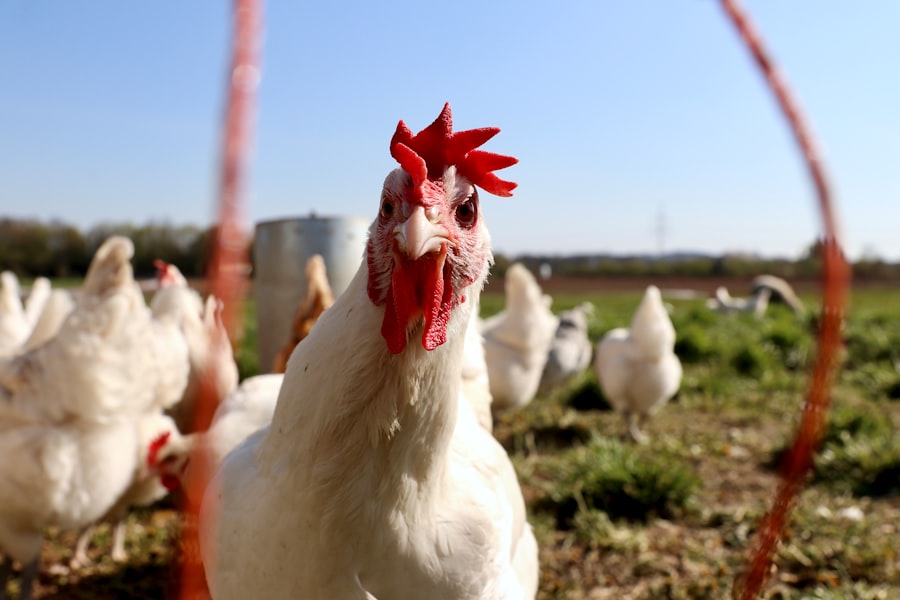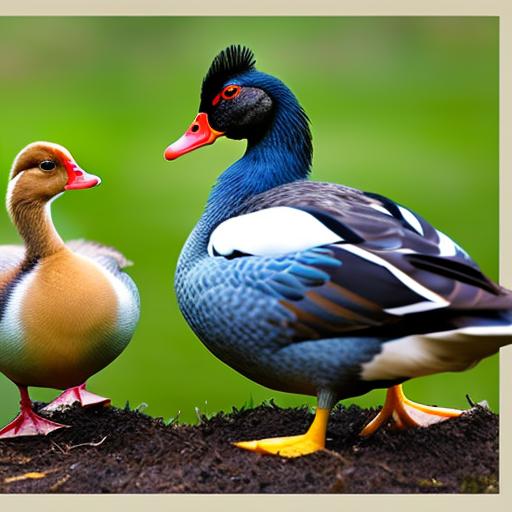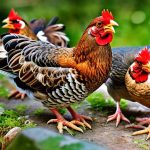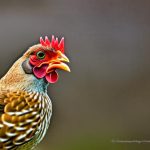Keeping ducks and chickens together in a chicken coop is a popular practice among backyard poultry enthusiasts. Not only does it provide a unique and diverse flock, but it also offers several benefits. Ducks and chickens can coexist harmoniously, and their presence can enhance the overall experience of raising poultry. In this article, we will explore the benefits of keeping ducks with chickens, discuss the differences between the two species, provide tips on choosing compatible breeds, and offer guidance on creating a suitable living environment for both ducks and chickens.
Key Takeaways
- Keeping ducks with chickens can provide numerous benefits, including increased egg production and pest control.
- Ducks and chickens have different needs and behaviors, so it’s important to understand their differences before keeping them together.
- Choosing compatible breeds of ducks and chickens is crucial for a harmonious living environment.
- A suitable living environment for ducks and chickens should include access to water, shelter, and space to roam.
- Feeding ducks and chickens together requires careful consideration of their dietary needs and preferences.
Benefits of Keeping Ducks with Chickens
One of the main benefits of keeping ducks with chickens is increased egg production. Ducks are known for their high egg-laying capabilities, and when they are housed with chickens, their presence can stimulate the hens to lay more eggs as well. This can be especially advantageous for those who are looking to maximize their egg production.
Another benefit of keeping ducks with chickens is pest control. Ducks are natural foragers and have a voracious appetite for insects, slugs, and snails. By allowing them to roam freely in the same area as the chickens, they can help control pests that may otherwise harm the flock or damage crops. This natural pest control can reduce the need for chemical pesticides and create a healthier environment for both ducks and chickens.
Personal experiences often highlight the benefits of keeping ducks with chickens. Many poultry keepers have reported that their ducks and chickens form close bonds and exhibit social behaviors that are fascinating to observe. Ducks and chickens have different personalities and behaviors, which can create an interesting dynamic within the flock. Additionally, ducks are known for their entertaining antics, such as splashing in water or waddling around the yard, which can bring joy and amusement to poultry keepers.
Understanding the Differences Between Ducks and Chickens
Before deciding to keep ducks and chickens together, it is important to understand the differences between the two species. Ducks and chickens have distinct behaviors, dietary requirements, and living preferences that need to be taken into account.
In terms of behavior, ducks are generally more active and curious than chickens. They enjoy exploring their surroundings and are known for their love of water. Ducks also have a different social structure compared to chickens, as they tend to form tight-knit groups and rely on each other for safety and companionship. Chickens, on the other hand, are more hierarchical and establish a pecking order within the flock.
When it comes to diet, ducks have different nutritional needs compared to chickens. While both species require a balanced diet of grains, proteins, and vitamins, ducks have a higher requirement for niacin. This nutrient is essential for their growth and overall health. Therefore, it is important to ensure that ducks receive adequate niacin in their diet, either through specialized duck feed or by supplementing their diet with niacin-rich foods.
Living requirements also differ between ducks and chickens. Ducks require access to water for bathing and swimming, as well as a suitable shelter to protect them from predators and harsh weather conditions. Chickens, on the other hand, are more adaptable and can thrive in a variety of environments. Understanding these differences is crucial for providing appropriate care and ensuring the well-being of both ducks and chickens.
Choosing the Right Breeds of Ducks and Chickens to Keep Together
When keeping ducks and chickens together, it is important to choose breeds that are compatible with each other. Some breeds of ducks and chickens may have different temperaments or living requirements that may not be suitable for cohabitation.
When selecting duck breeds, it is recommended to choose those that are known for their calm temperament and ability to get along with other poultry. Muscovy ducks, for example, are often recommended for their docile nature and adaptability to living with chickens. Other breeds such as Pekin, Khaki Campbell, and Rouen ducks are also known to be compatible with chickens.
For chickens, it is advisable to choose breeds that are not overly aggressive or territorial. Some chicken breeds, such as Rhode Island Reds, Australorps, and Orpingtons, are known for their calm and friendly nature, making them good choices for cohabitation with ducks.
It is important to note that individual personalities can vary within a breed, so it is always recommended to observe the behavior of individual birds before introducing them to the flock.
Creating a Suitable Living Environment for Ducks and Chickens
Creating a suitable living environment is crucial for the well-being of both ducks and chickens. This includes providing adequate space, shelter, and water sources.
Ducks require more space compared to chickens due to their active nature and need for water. Ideally, they should have access to a pond or a shallow pool where they can swim and bathe. If a natural water source is not available, a small kiddie pool or a shallow container filled with water can suffice. Ducks also need ample space to roam and forage, so providing a large outdoor area or allowing them to free-range can be beneficial.
Chickens, on the other hand, require a secure coop for protection against predators and adverse weather conditions. The coop should be well-ventilated and provide enough space for the chickens to move around comfortably. It should also have nesting boxes for egg-laying and perches for roosting.
When designing the living environment, it is important to consider the safety of both ducks and chickens. Fencing should be secure enough to prevent predators from entering the area, and any potential hazards such as toxic plants or sharp objects should be removed.
Building a Chicken Coop for Ducks and Chickens

Building a chicken coop that is suitable for both ducks and chickens requires some special considerations. Ducks have different needs compared to chickens, particularly when it comes to water and bedding.
When building a coop, it is important to include a separate area for the ducks to access water. This can be a small pond or a designated space with a shallow pool. The water area should be easily accessible for the ducks and designed in a way that prevents flooding or excessive mess.
In terms of bedding, ducks require more moisture-absorbent material compared to chickens. While straw or wood shavings may be suitable for chickens, ducks benefit from materials such as straw mixed with wood chips or sawdust. This helps to absorb moisture and prevent the buildup of ammonia, which can be harmful to the ducks’ respiratory system.
Additionally, it is important to ensure that the coop is well-ventilated and provides enough space for both ducks and chickens to move around comfortably. The coop should also have separate nesting boxes for each species, as ducks prefer to lay their eggs on the ground while chickens prefer elevated nesting boxes.
Feeding Ducks and Chickens Together
Feeding ducks and chickens together can be done successfully with some considerations. While both species have similar dietary requirements, there are some differences that need to be taken into account.
Both ducks and chickens require a balanced diet consisting of grains, proteins, vitamins, and minerals. Commercial poultry feed formulated for layers can be suitable for both species. However, it is important to ensure that the feed contains adequate niacin for the ducks’ needs.
In addition to commercial feed, ducks and chickens can also benefit from foraging and consuming natural foods. Ducks are excellent foragers and enjoy eating insects, slugs, snails, and various types of vegetation. Allowing them access to a diverse range of plants and insects can enhance their diet and provide mental stimulation.
It is important to monitor the feeding process to ensure that all birds have access to food. Ducks tend to eat faster than chickens and may dominate the feeding area. Providing multiple feeding stations or scattering the feed in different areas can help ensure that all birds have equal access to food.
Managing the Health of Ducks and Chickens
When keeping ducks and chickens together, it is important to monitor their health and take preventive measures to ensure their well-being. Regular health checks, proper hygiene, and vaccination protocols are essential for maintaining a healthy flock.
Regular health checks involve observing the birds for any signs of illness or distress. This includes monitoring their behavior, appetite, and appearance. Any changes in behavior or physical condition should be investigated promptly to prevent the spread of disease.
Maintaining proper hygiene is crucial for preventing the transmission of diseases. This includes regularly cleaning and disinfecting the coop, removing any feces or soiled bedding, and providing clean water sources. Ducks and chickens should also be kept separate from wild birds or other poultry to minimize the risk of disease transmission.
Vaccination protocols can vary depending on the region and specific diseases prevalent in the area. It is important to consult with a veterinarian or local agricultural extension office to determine the appropriate vaccination schedule for ducks and chickens in your area.
Addressing Potential Issues with Keeping Ducks and Chickens Together
While keeping ducks and chickens together can be a rewarding experience, there are potential issues that may arise. It is important to be prepared and address these issues promptly to ensure the well-being of both species.
One potential issue is aggression between ducks and chickens. While most ducks and chickens can coexist peacefully, there may be instances where aggression occurs. This can be due to territorial disputes or differences in social structure. If aggression is observed, it may be necessary to separate the birds temporarily or provide additional space to reduce tension.
Another potential issue is disease transmission between ducks and chickens. While ducks are generally more resistant to certain diseases compared to chickens, they can still act as carriers and transmit diseases to other poultry. It is important to practice good biosecurity measures, such as keeping the coop clean, preventing contact with wild birds, and monitoring the health of the flock regularly.
Conclusion and Final Thoughts on Keeping Ducks with Chickens in a Chicken Coop
Keeping ducks and chickens together in a chicken coop can be a rewarding and beneficial experience. The presence of ducks can increase egg production, provide natural pest control, and add diversity to the flock. However, it is important to understand the differences between ducks and chickens, choose compatible breeds, create a suitable living environment, and manage their health effectively.
By following these guidelines and being attentive to the needs of both ducks and chickens, poultry keepers can enjoy the unique experience of raising these two species together. The bond between ducks and chickens can be fascinating to observe, and their presence can enhance the overall enjoyment of backyard poultry keeping. So, if you are considering keeping ducks with chickens in a chicken coop, take the necessary steps to ensure their well-being and enjoy the benefits that this combination can bring.
If you’re interested in keeping ducks with chickens, you may also want to check out this informative article on how to care for goslings. It provides valuable insights and tips on raising healthy and happy goslings. Whether you’re a beginner or an experienced poultry keeper, this article from Poultry Wizard is a great resource to ensure the well-being of your feathered friends. Learn more here.
FAQs
What are the benefits of keeping ducks with chickens?
Keeping ducks with chickens can provide several benefits such as increased pest control, improved soil fertility, and enhanced egg production. Ducks can also help to keep the coop clean by eating insects and other pests.
What are the challenges of keeping ducks with chickens?
One of the main challenges of keeping ducks with chickens is that ducks require more water than chickens. They also have different dietary needs and may require separate feeding arrangements. Additionally, ducks can be messy and may create more mud around the coop.
Can ducks and chickens share the same coop?
Yes, ducks and chickens can share the same coop as long as there is enough space for both species. However, it is important to provide separate nesting boxes for each species to prevent competition and aggression.
What should I feed my ducks and chickens?
Ducks and chickens have different dietary needs, so it is important to provide separate feeding arrangements. Chickens require a diet high in protein, while ducks require a diet high in niacin. Both species can benefit from a diet that includes grains, vegetables, and insects.
Do ducks and chickens get along?
Ducks and chickens can get along, but it depends on the individual animals and their personalities. It is important to introduce them slowly and monitor their interactions to prevent aggression and bullying. Providing enough space and resources can also help to reduce competition and conflict.
Meet Walter, the feathered-friend fanatic of Florida! Nestled in the sunshine state, Walter struts through life with his feathered companions, clucking his way to happiness. With a coop that’s fancier than a five-star hotel, he’s the Don Juan of the chicken world. When he’s not teaching his hens to do the cha-cha, you’ll find him in a heated debate with his prized rooster, Sir Clucks-a-Lot. Walter’s poultry passion is no yolk; he’s the sunny-side-up guy you never knew you needed in your flock of friends!







